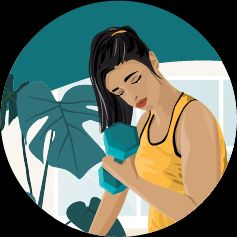When you have ulcerative colitis (UC), planning ahead can make it easier to socialize and stay connected with friends and family.
UC is a type of inflammatory bowel disease (IBD). Symptoms include abdominal pain, bowel frequency and urgency, and rectal bleeding.
Unpredictable and exhausting symptoms can make it challenging to stay social. It might feel easier to cancel your plans, but staying connected with others is good for your health. People with IBD have higher rates of anxiety and depression. A lack of social connections can make this worse.
There are times when staying home is an important part of taking care of yourself. Other times, being social can boost your physical and mental health.
Here’s how to make it work.
Dr. Amber Cohen is a clinical psychologist and CEO of The Cohen Clinic. The Cohen Clinic is an Ontario-based holistic therapy practice focused on integrating the mind-body connection to promote mental wellness.
“Living with ulcerative colitis can make it difficult to stay social due to the unpredictable nature of the condition,” explained Cohen. “Symptoms like frequent bathroom urgency, abdominal pain, fatigue, and bloating can create anxiety and embarrassment, making social plans feel stressful or overwhelming.”
Cohen validated how several things can make socializing feel complicated. “Individuals may worry about finding restroom access, managing symptoms in public, or having to cancel plans at the last minute, leading them to avoid social interactions altogether,” she said. “Additionally, the emotional toll of living with a chronic illness, such as low energy or feelings of being different, can further reduce motivation to engage socially.”
Being social might feel like the last thing you want to do, but there are health benefits to doing so.
“Maintaining social connections is important for individuals with ulcerative colitis or other chronic conditions,” explained Cohen. “Chronic illnesses have so many nuanced difficulties to contend with, which can leave people feeling very alone with their unique challenges.”
Isolation and loneliness are common in people with UC. A
“Isolation can significantly impact [your] health,” said Cohen. “It often leads to heightened levels of anxiety, depression, and feelings of loneliness, which can worsen overall emotional well-being.”
Isolation can also affect your physical health. “[It’s] associated with elevated stress levels, disrupted sleep, and a weakened immune system,” said Cohen.
We all need community. Researchers have found a link between a lack of social connections and a lower quality of life in people with IBD.
“The lack of social connection can make it harder to cope effectively, highlighting the importance of human connection to overall health,” said Cohen. “Social interactions encourage positive health behaviors and coping strategies, contributing to improved overall health outcomes.”
It may feel like too much work to gather with others. There are things you can do to make it a little more manageable. Here are things to consider, whether you’re meeting with a group or team or joining friends for a meal.
Find out where the public restrooms are
Make sure to scope out where the bathrooms are. Knowing that bathrooms are available, unlocked, and clean can put your mind at ease. Bathroom access can also be a factor in deciding where to go. Call ahead if you’re not sure about the bathroom situation.
You might consider keeping a card that says you have a medical condition and may need urgent bathroom access. This can allow you to use a bathroom when no public one is available.
The Crohn’s & Colitis Foundation has a mobile app that helps you find available public restrooms in your area.
Keep items on hand
It’s always smart to have backup supplies. This can be comforting if you’re worried about managing unpredictable symptoms.
Keep flushable wipes, toilet paper, any medications you may need, and extra underwear and pants with you. Bring disposable zipper storage bags to hold anything that needs cleaning.
How to talk with friends and family about what you need
While it’s always your decision to disclose your health history, there are benefits to having loved ones who know what is going on with your condition.
“Being open with trusted friends or family about your condition can reduce stress and help them offer support,” recommended Cohen. “Emotional support from friends, family, or support groups provides a sense of belonging and understanding, enhancing mental well-being.”
People who care about you will want to know how to support you and what they can do to help make socializing more accessible. They will understand if you need to cancel or modify your plans to make it work for you.
You won’t always have control over the details of social gatherings. If you do, great. Otherwise, you’ll need to figure out if you can make it work for you.
“Planning ahead is key,” said Cohen. “Choose locations with accessible restrooms and bring along items that provide comfort, like extra supplies or snacks. This can help ease anxiety.”
Remember that you don’t have to attend everything. Don’t feel bad about skipping things that aren’t a good fit. Save your energy to attend the events that matter to you.
Cohen also reminded folks that there are different ways to stay connected. “If in-person plans currently feel overwhelming, start small with shorter outings close to home or one-on-one meetups. This can make socializing feel more manageable. You can build on these successes to larger social goals.”
She’s also a believer in the power of peer support. “Joining support groups, whether online or in-person can provide understanding and connection [for those with UC],” said Cohen. “This is a reminder that you’re not alone in this experience.”
Invite people over
Consider hosting gatherings at your place. This way, you can be comfortable in your own space, plus you can decide the activities and dress code. Hosting doesn’t mean you have to do all the work. Ask guests to bring food, games, or activities or if they can help with some of the prep work.
If hosting isn’t an option for you, ask a good friend or family member if they can host so you’ll still be in a familiar space.
Keep things short when you’re having a flare
If you’re not feeling great but want to make an appearance, remember that you can just do a short visit. If you feel comfortable, you can give the host a heads-up of your plan. Then, you can leave quietly when you’re ready.
Consider gentle hobbies instead of more intense sports
Joining a club can be a great way to get out and meet new people or learn new things. Think about the types of groups you’re interested in and then find out more details.
Are meetups in a place with bathrooms nearby? Are you likely to still be able to attend even if you’re feeling worn down? Some activities might not be a good fit when you’re experiencing pain or exhaustion.
You can also consider virtual options such as painting classes, learning a new language, or attending a book club. Virtual groups can allow you to connect with others from the comfort of your home.
Symptoms of UC can make it hard to socialize. You may feel like avoiding social gatherings, but staying connected is good for your health.
“Engaging with a supportive community can alleviate feelings of isolation, anxiety, and depression, which are common among those managing chronic illnesses,” said Cohen. With some planning ahead, you can feel more comfortable getting out.








